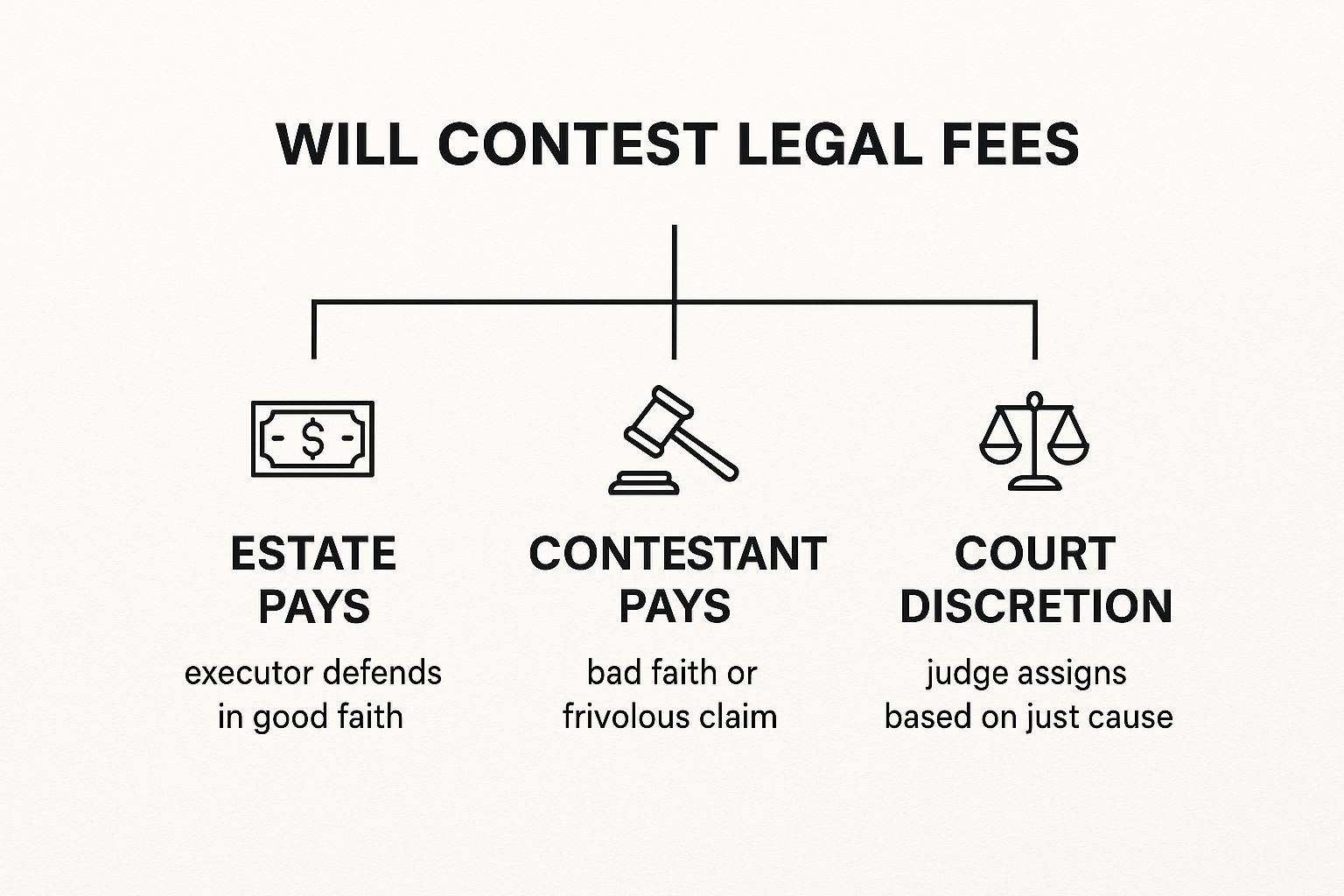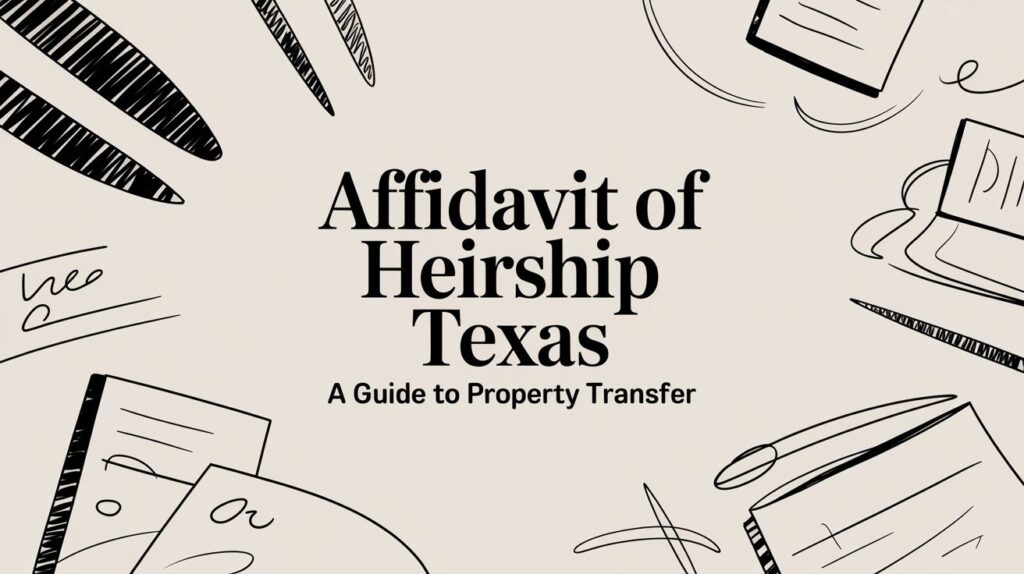When a loved one passes away, navigating the emotional landscape is difficult enough without the added stress of a legal dispute. If you find yourself questioning the validity of a will, one of the most pressing concerns is who pays legal costs when contesting a will. In Texas, there isn't a single, straightforward answer. The responsibility usually falls on either the estate itself or the person who brought the challenge, and the final decision rests with the probate court judge based on the specifics of the case.
Dealing with the loss of a family member is never easy, and our goal is to provide clear, compassionate guidance to help you understand your rights and what to expect during this challenging time.
The High Stakes of a Will Contest and Who Pays the Price
A will contest is a formal legal proceeding, a type of Probate Litigation, initiated to challenge the validity of a will. This action immediately raises a critical question for everyone involved: Who is responsible for the attorneys' fees and court costs?
In Texas, the court's decision is guided by two core principles found in the Texas Estates Code:
- Good Faith: Did the person defending or challenging the will act with honest intentions and a sincere belief in their position?
- Just Cause: Was there a reasonable, evidence-based reason for the legal action? In simple terms, was the lawsuit brought for a legitimate reason?
The answers to these questions are pivotal. They determine whether the estate's assets will be used to cover legal fees or if an individual will have to bear the cost. Before entering a legal battle, it's vital to understand fundamental concepts, like the executor's authority to alter a will, as a misunderstanding can lead to costly mistakes.
Getting a clear picture of potential expenses is a wise first step. You can learn more about the general costs associated with probate in Texas to better understand what you might be facing.
Three Potential Outcomes for Legal Fees
So, how does this usually play out? This infographic breaks down the three most common scenarios for how legal fees get assigned in a Texas will contest.

As you can see, the outcome really hinges on the court's perception of the motives and merits behind the dispute. This reinforces just how important it is to proceed with both good faith and just cause.
To give you a clearer snapshot of how these decisions are made, here’s a quick summary of the likely outcomes.
Who Typically Pays Legal Costs in a Texas Will Contest
| Scenario | Who Likely Pays the Fees | Key Factor |
|---|---|---|
| Executor Defends the Will Successfully | The estate pays the executor's legal fees. | The executor (the person named in the will to manage the estate) acted in good faith to uphold the decedent's wishes as written in the will. |
| Challenger Wins the Contest | The estate often pays the challenger's legal fees. | The challenger proved the will was invalid due to factors like undue influence or lack of capacity, showing just cause for the lawsuit. |
| Challenger Loses the Contest | The challenger pays their own legal fees and may have to pay the estate's fees too. | The court determined the lawsuit was brought in bad faith or without just cause, viewing it as a frivolous claim. |
This table shows just how much the concepts of "good faith" and "just cause" drive the final decision on who bears the financial burden of the lawsuit.
Ultimately, Texas law aims to protect the true intentions of the person who passed away while simultaneously discouraging frivolous lawsuits that do nothing but drain the estate's assets. Because these disputes carry such a heavy financial burden, understanding the rules from the very beginning is absolutely essential for making sound decisions during an emotional time.
Why the Estate Often Covers Legal Costs

It might seem counterintuitive for an estate—the very assets being fought over—to pay for a legal battle. However, in Texas, this is a common outcome. The law views defending a will not as a personal fight for the executor, but as a necessary administrative task to protect the final wishes of the person who passed away (the "decedent").
Think of it this way: the will is the estate's foundational legal document. When that document is challenged, the estate is expected to fund its own defense. This is a core concept in the field of Wills & Trusts and Probate Litigation. This principle also protects the executor, who is simply trying to fulfill their legal duty. The law does not expect an executor to spend their own money to defend a will they genuinely believe is valid.
The Good Faith and Just Cause Standard
The Texas Estates Code provides a clear framework for this process. An executor is generally entitled to be reimbursed from the estate for all necessary and reasonable expenses—including attorney’s fees—incurred while performing their duties, provided they act in "good faith."
Texas Estates Code Section 352.052 states that an executor who defends a will in good faith and with just cause, whether they succeed or fail, "shall be allowed" their necessary expenses out of the estate, including reasonable attorney's fees.
This legal protection is crucial. It allows an executor to focus on upholding the decedent's wishes without facing personal financial risk. If the executor believes the will is valid, they have a duty to defend it, and the law provides the financial means from the estate to do so. You can learn more about how these and other costs are managed in our guide on administering probate estate costs in Texas.
A Scenario of an Executor’s Duty
Let's look at a realistic example. Imagine Sarah is named the executor of her father’s estate. Her estranged brother, Mark, files a lawsuit to contest the will, claiming their father was not of sound mind when he signed it. Sarah, who spent a great deal of time with her father in his final years, is confident he was lucid and that the will reflects his true intentions.
Here is a step-by-step look at what happens next:
- Sarah Hires an Attorney: As executor, she hires a probate attorney to represent the estate and defend the will in court.
- Fees are Paid by the Estate: The attorney’s legal bills are paid from the estate's funds, not from Sarah's personal bank account.
- Sarah is Protected: As long as Sarah is acting in good faith to carry out her duties, she is not personally responsible for these costs, even if the legal challenge is lengthy.
In this scenario, Sarah is not defending her own inheritance; she is defending her father's documented wishes. Therefore, the estate bears the cost of its own defense.
When a Challenger Has to Pay the Legal Fees

While the estate often pays for the defense of a will, the person bringing the challenge—the "contestant"—takes a significant financial risk if their lawsuit is not based on solid evidence. If a will contest is filed for the wrong reasons, such as spite or greed, without any factual support, it is considered a frivolous lawsuit.
In these situations, the challenger must pay for their own attorney’s fees. Even more, a judge can order them to pay for the estate's legal defense costs as well. This outcome hinges on two critical legal concepts: "bad faith" and the lack of "just cause." Texas courts strongly discourage actions that waste judicial time and unfairly deplete the assets intended for the rightful heirs.
You cannot challenge a will simply because you are unhappy with what you received. You must have a valid legal reason supported by credible proof.
What Constitutes a Bad Faith Claim?
A bad faith claim is a lawsuit brought with dishonest intentions, not to correct a genuine wrong but to harass, delay, or drain the estate's finances. To determine if a claim was brought in bad faith, the court will carefully examine the challenger’s motives and the evidence—or lack thereof.
For example, a son is left a smaller inheritance than his sister. Furious, he files a will contest alleging his sister exerted undue influence over their father. However, he has no witnesses, no medical records, and no suspicious circumstances to support his claim. His entire case is fueled by resentment. A judge would almost certainly see this as a bad faith action. The son would be responsible for his own legal bills and could be ordered to reimburse the estate for its defense costs.
This "loser pays" principle serves to deter frivolous lawsuits by creating a clear financial risk for bringing a weak case. Understanding your financial responsibilities is critical. Our guide explains how probate attorneys charge in Texas, which can help you anticipate potential costs. Before contesting a will, it is essential to consult with an experienced probate litigation attorney to evaluate your case and understand the financial risks involved.
A Realistic Look at a Good Faith Will Contest

To better understand these legal concepts, let's walk through a common scenario in Texas probate courts.
Imagine a family with two adult siblings, Maria and David. For years, their father, Robert, had a will that divided his estate equally between them, with Maria named as the executor. A few weeks after Robert’s passing, a new will surfaces. This will, signed just months before his death, leaves a significant portion of the estate to a new neighbor who had recently started helping Robert with errands. Maria, who saw her father often, believes he was of sound mind and simply changed his wishes. As executor, she feels it is her duty to defend this newer will.
David, however, is deeply concerned. He had noticed the neighbor becoming increasingly involved in their father’s finances and felt Robert was being isolated from the family. He suspects undue influence—a situation where someone pressures a vulnerable person into changing their will for personal gain—and believes he must contest the new will.
The Legal Paths of Maria and David
With a potential legal battle looming, both siblings take their first steps, illustrating how the question of "who pays?" begins to take shape.
David’s Approach (The Challenger): David consults a probate attorney and presents his concerns. He provides specific examples of the neighbor's behavior and a timeline of events. The attorney recognizes a strong, evidence-based claim and agrees to take the case on a contingency fee basis. This means the law firm is paid only if David wins, receiving a percentage of the assets he recovers. This arrangement is common for promising cases and allows people to seek justice without large upfront costs.
Maria’s Approach (The Executor): Acting in her role as executor, Maria hires her own probate lawyer to defend what she believes is her father's valid will. Because she is acting in her official capacity and in good faith, she can use estate funds to pay her lawyer’s retainer and ongoing hourly fees.
How the Court Views Their Actions
As the case proceeds, the court examines not just who is right or wrong, but the motivations and evidence from both sides.
Maria's legal defense is funded by the estate because she is fulfilling her duty as executor. She is not fighting for her own inheritance but defending the document she was appointed to execute.
Meanwhile, David's challenge is evaluated based on whether he had "just cause." He is not acting out of simple disappointment; he has legitimate, evidence-based reasons to believe his father was manipulated.
This scenario highlights the fairness embedded in Texas law. It empowers an executor to defend a will using estate funds while also protecting a challenger with a legitimate claim from being bankrupted by legal fees. The system is designed to uncover the decedent's true wishes and ensures that reasonable legal costs can be covered by the estate when a dispute is necessary.
How No-Contest Clauses Work in Texas
Some Wills & Trusts contain a powerful tool called a no-contest clause, designed to discourage beneficiaries from challenging the will. In plain English, this clause states that if an heir contests the will in court and loses, they forfeit any inheritance they were due to receive. It's a high-stakes provision often called an in terrorem clause—Latin for "in fear."
The purpose is to prevent family disputes and frivolous lawsuits that can deplete an estate's resources. But what if you have a legitimate, evidence-backed reason to believe the will is invalid, such as coercion or fraud? Fortunately, Texas law provides a critical safeguard.
The "Good Faith and Just Cause" Exception
Under Section 254.005 of the Texas Estates Code, a no-contest clause cannot be enforced if the person challenging the will did so in "good faith" and with "just cause." This is a vital protection that prevents rightful heirs from being intimidated into silence.
This means you can challenge a will without the automatic fear of being disinherited, as long as you have honest intentions and a reasonable basis for your claim. The court will examine your evidence. If you have solid grounds to believe the will was a product of undue influence or that the signer lacked mental capacity, the no-contest clause cannot be used against you—even if you do not ultimately win the case.
Understanding No-Contest Clauses in Texas
This table breaks down when a no-contest clause is likely to be enforced versus when it is not.
| Factor | Clause Likely Enforced (Beneficiary Loses Inheritance) | Clause Likely Unenforceable (Beneficiary Keeps Inheritance) |
|---|---|---|
| Reason for Contest | The beneficiary is simply unhappy with their share and has no supporting evidence of wrongdoing. | The beneficiary has credible evidence, like witness testimony or medical records, suggesting undue influence. |
| Legal Basis | The claim is frivolous, based on speculation or personal animosity toward another heir. | The claim is based on a legitimate legal argument, such as improper will execution or lack of testamentary capacity. |
| Court's Finding | The lawsuit was filed in bad faith to harass the executor or delay the probate process. | The lawsuit was filed in good faith with just cause, even if the challenger does not ultimately prevail. |
The court's decision will hinge on whether the challenge was a legitimate attempt to correct a perceived injustice or merely an effort to get more money. An experienced attorney specializing in Probate Litigation can evaluate your claim to determine if it meets the good faith and just cause standard.
Practical Tips for Managing Will Contest Costs
Entering a will contest without a clear financial strategy can be overwhelming. Whether you are an executor defending an estate or a beneficiary fighting for what is right, every decision has financial implications. Managing these costs—and the emotional toll—is a critical part of the process.
Ultimately, when a judge decides who pays legal costs when contesting a will, the behavior of the parties involved is paramount. The court will analyze whether the executor acted in good faith and if the challenger brought their claim with just cause. If you are the executor, this means keeping meticulous records is essential to justify every legal expense to the court and the beneficiaries.
Attorney Fees: How Do They Actually Work?
Lawyers handling Probate Litigation typically use one of three fee structures:
- Hourly Fees: The most traditional model, where you pay for the attorney's time at a set hourly rate. This is common for executors defending a will, as the estate can cover reasonable costs.
- Contingency Fees: Often described as "pay only if you win," the attorney takes a percentage of the assets you recover. This is a vital option for challengers with a strong case but limited funds.
- Flat Fees: Less common in litigation, a flat fee is a single price for a specific legal task. This may apply to routine parts of the process but rarely for an entire will contest.
It is no secret that legal fees can be substantial. For a broader look at the legal and financial considerations in estate management, it is wise to do your research. A 2021 global survey highlighted the rising cost of legal services, a significant factor in the decision to contest a will. You can see the trends in legal costs for yourself here.
Good Faith vs. Just Cause: Who Bears Fees in Texas Will Contests
The question of who pays legal fees in a Texas will contest is not a matter of winning or losing, but of motive and merit. The Texas Estates Code is designed to protect both the decedent’s final wishes and the rights of heirs who have legitimate concerns. Executors acting in "good faith" can use estate funds for defense, while challengers with "just cause" may have their fees covered by the estate, even if they don't win. This framework ensures that valid claims can be heard without financially ruining the challenger, while discouraging frivolous lawsuits intended to harass or drain the estate. Understanding this balance is the first step toward making an informed decision during a difficult time.
Common Questions About Will Contest Costs in Texas
When you're grieving, practical questions about money, fairness, and risk can be overwhelming. Here are some of the most common concerns Texas families have about the financial side of these disputes.
Can I Use My Inheritance to Pay for a Will Contest?
This is a frequent question, and the answer is generally no—at least not initially. You cannot access your potential inheritance to pay your lawyer while the dispute is ongoing. The upfront legal fees must come from your own funds.
However, if your challenge is successful, the court can order the estate to reimburse you for your reasonable attorney's fees. Additionally, many probate attorneys will take strong cases on a contingency fee basis. This means they only get paid a percentage of the assets you recover if you win, which can make pursuing a just claim financially possible.
What if the Executor Wrongly Influenced the Will?
Texas law is strict when it comes to misconduct. If an executor is found to have acted in bad faith—for example, by using undue influence to manipulate the person who wrote the will—they can be held personally liable for all legal costs.
In such a case, the executor loses the right to be reimbursed by the estate. A court can order them to pay the successful challenger's legal fees directly from their own funds. This is a critical protection against individuals who abuse a position of trust, which can sometimes lead to a need for Guardianship proceedings.
How Does the Length of a Will Contest Affect the Cost?
As a rule, the longer a will contest continues, the more expensive it becomes for everyone involved. A straightforward dispute might resolve in a few months, while a complex, contentious battle could last over a year.
Every deposition, court filing, and hour spent in discovery adds to the legal bills. This is why exploring mediation or negotiating a settlement is often the most practical and compassionate path forward, as it can reduce the financial and emotional strain on the family. Understanding the complete Texas Probate Process can help set realistic expectations.
If you’re facing probate in Texas, our team can help guide you through every step — from filing to final distribution. Schedule your free consultation today.







